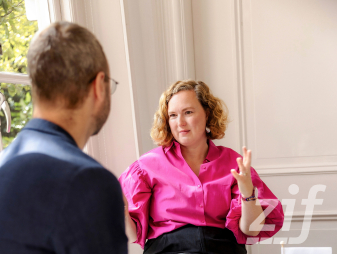Sarah Stephan
Project Officer with a regional focus on Ukraine and Moldovar
OSCE High Commissioner on National Minorities (HCNM) in Den Haag
Operating period: since April 2016
Previous positions:
- Several years of professional experience as a research assistant and project manager focusing on minorities, autonomy and language policy at a peace and conflict research institute in Finland
- PhD candidate in international law at Åbo Akademi University in Turku, Finland
I am responsible for programmes...
...which, within the framework of the High Commissioner's ‘Early Action’ mandate, aim to promote social cohesion and preventively reduce tensions. To this end, I develop and support initiatives based on sound analysis that bring governments and minorities into constructive dialogue.
My contribution lies in designing programmes that have a long-term strategic impact and are also practical to implement in the context of the actors involved. My work is based on the HCNM's approach of quiet diplomacy, which relies on trust and discretion to promote viable solutions at an early stage.
One of the biggest challenges...
...is that minority rights are increasingly being exploited in politically sensitive contexts such as Ukraine and Moldova – often through external narratives or disinformation campaigns. This exploitation hinders constructive dialogue, can increase mistrust between governments and minorities, and jeopardises the acceptance of reforms. In addition, resources such as time, personnel and budget are limited, while social needs remain complex.
This is precisely why programme design plays a central role: projects must be designed to strengthen local voices, be based on reliable data and remain resilient to political instrumentalisation. This requires flexibility, careful coordination with partners and a high degree of conflict awareness.
What motivates me most is...
...that my work has the potential to strengthen social cohesion and prevent conflicts. The combination of analytical work, practical programme design and quiet diplomacy makes every day exciting: research and data flow directly into policy recommendations that improve dialogue between governments and minorities.
Mahatma Gandhi is said to have once said, ‘A civilisation should be judged by how it treats its minorities.’ This idea struck a particular chord with me and accompanies me again and again in my work. I am also inspired by the close exchange with committed partners and a diverse, competent team that makes the work not only more effective but also enriching.
